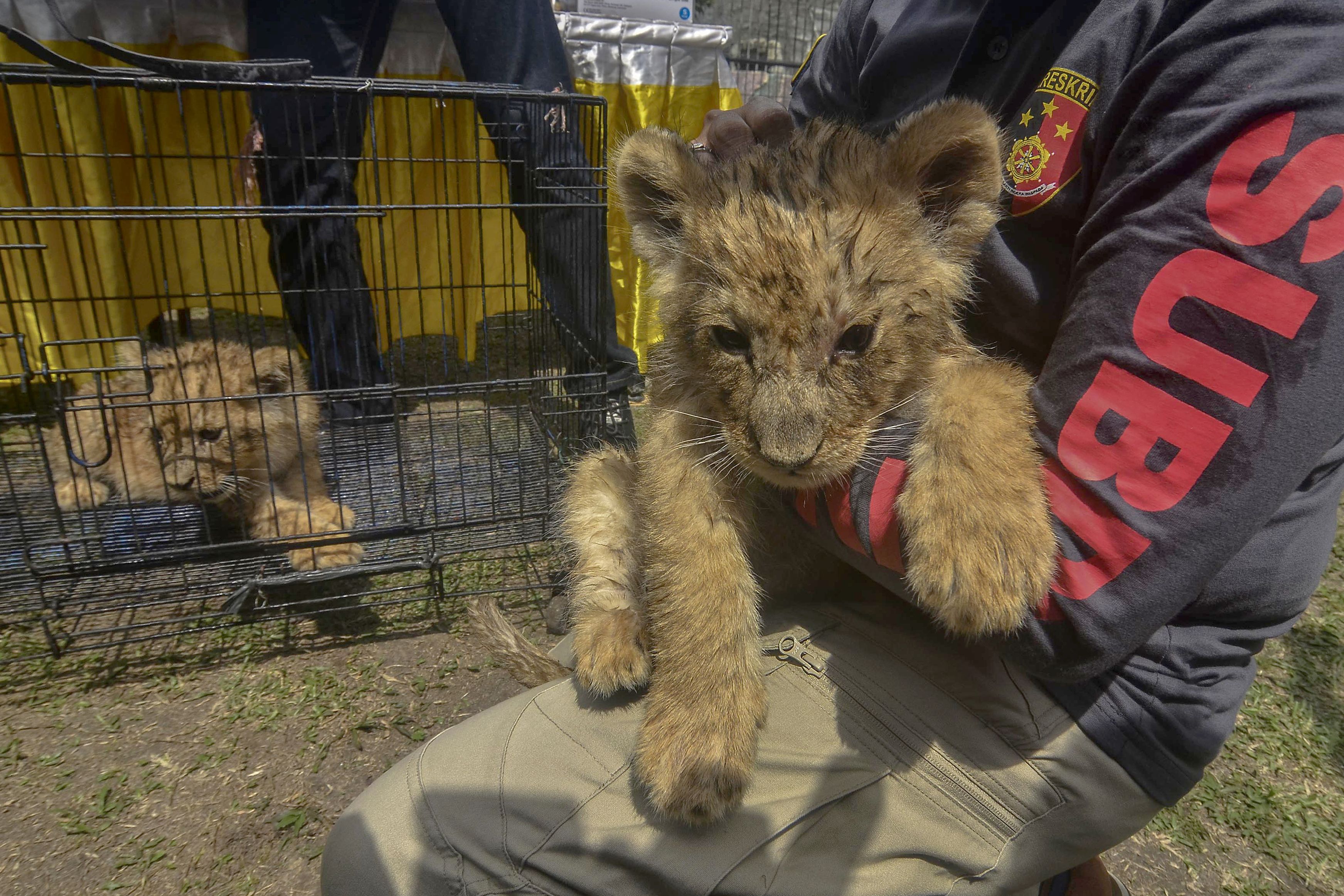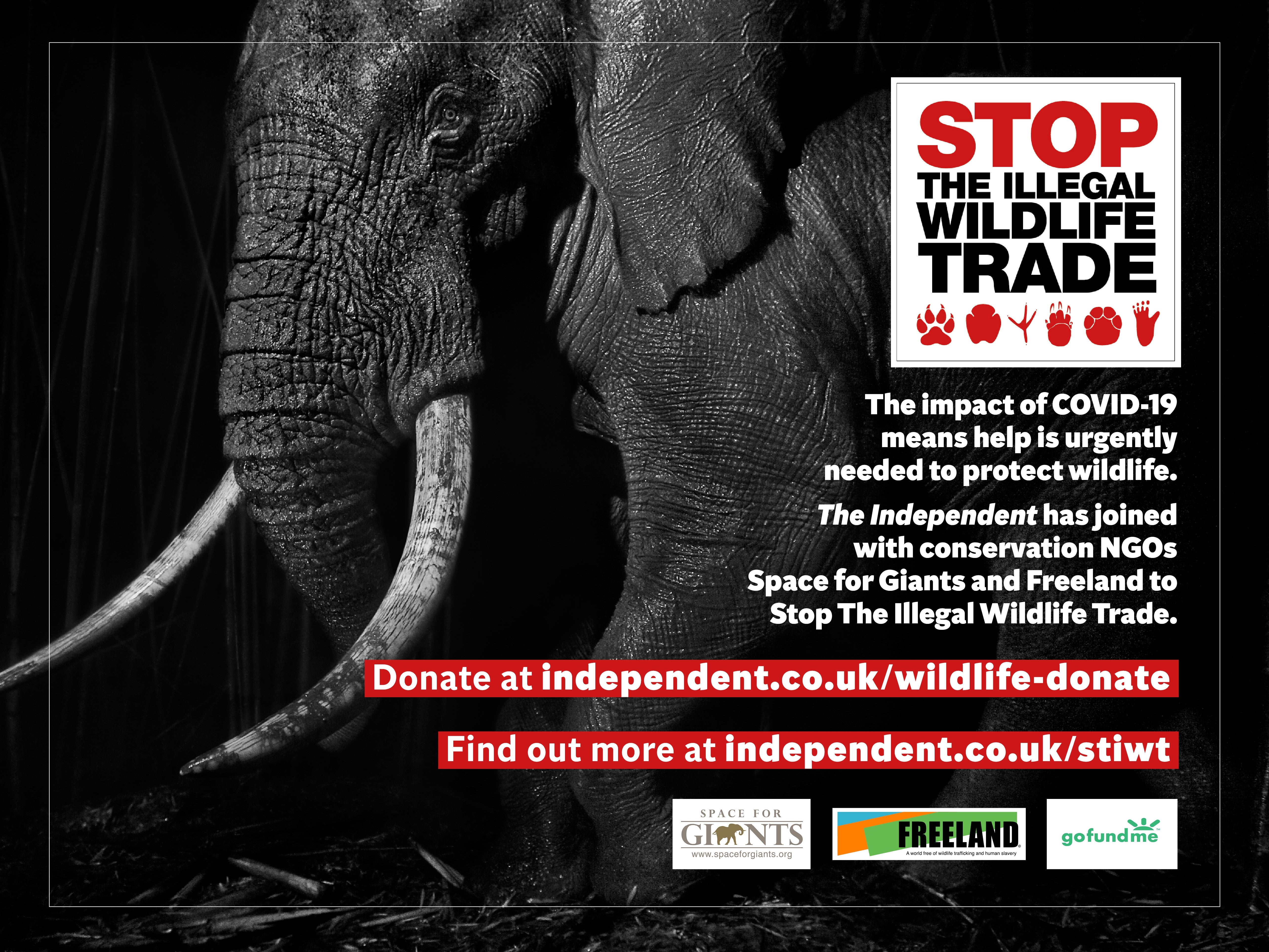Southeast Asia is the front line of the illegal wildlife trade battle. It’s time for G7 to take action
We must rethink our approach to tackling the illegal wildlife trade in the wake of Covid-19 – it is key to preventing future pandemics

Your support helps us to tell the story
From reproductive rights to climate change to Big Tech, The Independent is on the ground when the story is developing. Whether it's investigating the financials of Elon Musk's pro-Trump PAC or producing our latest documentary, 'The A Word', which shines a light on the American women fighting for reproductive rights, we know how important it is to parse out the facts from the messaging.
At such a critical moment in US history, we need reporters on the ground. Your donation allows us to keep sending journalists to speak to both sides of the story.
The Independent is trusted by Americans across the entire political spectrum. And unlike many other quality news outlets, we choose not to lock Americans out of our reporting and analysis with paywalls. We believe quality journalism should be available to everyone, paid for by those who can afford it.
Your support makes all the difference.Covid-19, which the world has now been grappling with for over a year after it is believed to have originated in animals before passing to humans, is no longer a new phenomenon.
But the Covid-19 pandemic, which is causing devastating impacts globally, continues to change our lives in new aspects and in new ways.
In addition to its impact on global health, the virus has also caused global economic decline, and threatened regional and international security. Southeast Asia, where I am from, has felt these impacts. So, I would like the G-7 to consider the threat that wildlife trafficking poses to us all, and what we must all do about this threat.
With the Association of Southeast Asian Nations (ASEAN) Community Vision 2025 coming into effect in just a few years, the need for improving national laws and creating a proper regional legislative framework to combat wildlife crime is becoming increasingly urgent. There is still much work to be done to strengthen legislation in wildlife conservation and management and in combating wildlife trafficking around the world, especially in Asia.
Through most of the Covid-19 pandemic, the world’s focus has been on repairing damage already done, through vaccine rollout and unprecedented economic recovery packages. But instead of being just reactive, we need to be proactive by promoting and scaling up pandemic prevention solutions. These long-term prevention-oriented solutions than to pay for post-damage response and recovery.
It is a wake-up call to rethink global approaches to protecting natural resources and the health of billions of people. In the wake of the current crisis, solutions are being deployed to manage the pandemic and its far- reaching impact to prevent similar outbreaks in the future. Among the first solutions, tackling wildlife trafficking is key to preventing future pandemics.
The ASEAN region has been mainly used for the transit of illegal wildlife products, or as a destination countries for goods. southeast Asia is a global hotspot for wildlife crime and a regional transportation hub for protected wildlife and wildlife products destined for consumer markets. The borders throughout ASEAN suffer from uneven enforcement, loopholes and weak penalties for violators of crimes such as wildlife trafficking. Trade in live animals whether it is legal or illegal trade pose risks to global human health, periodically causing disease outbreaks.
STOP THE ILLEGAL WILDLIFE TRADE
We are working with conservation charities Space for Giants and Freeland to protect wildlife at risk from poachers due to the conservation funding crisis caused by Covid-19. Help is desperately needed to support wildlife rangers, local communities and law enforcement personnel to prevent wildlife crime. Donate to help Stop the Illegal Wildlife Trade HERE
Ending trade in high-risk wildlife and reducing wildlife consumption are urgent actions that we need to take to reduce wildlife-borne disease risks to humans. This can be achieved through improved laws and budgets, but also through new conservation restitution measures.
Global collective effort is underway across governments, parliaments, the UN, international and national organisations, the private sector, local communities and others, to combat wildlife trade.
Over the past two decades, ASEAN has facilitated strategic and tactical responses to an emerging non-traditional security threat in the region, including wildlife trafficking. Since 2005, with the creation of the ASEAN Wildlife Enforcement Network (ASEAN-WEN), the fight against biodiversity exploitation and trafficking of endangered wildlife species within and throughout our region, has brought to a higher level. Reaffirming strong and timely responses to the current coronavirus pandemic, ASEAN member states adopted the Declaration of the Special ASEAN Summit on Coronavirus Disease 2019 (Covid-19) on 14 April 2020.

The ASEAN Inter-Parliamentary Assembly (AIPA) consisting of Member Parliaments from 10 countries in Southeast Asia, has played an instrumental role in familiarising the peoples of southeast Asia with policies aimed at promoting ASEAN’s goals and priorities based on the three pillars of the ASEAN Integration process. AIPA has reinforced the region’s commitment to combat cross-border crime and, significantly, has included trafficking of wildlife, putting them on par with other major transnational crimes such as drug trafficking, human trafficking, terrorism and arms smuggling.
Together with governmental efforts supporting the harmonisation of environmental laws to combat transnational crime and wildlife crime, AIPA General Assemblies approved resolutions to strengthen law enforcement and regional cooperation in order to combat wildlife crime. Member parliaments have emphasised the importance of reform of their regulations in order to stop wildlife trafficking and protect biodiversity in the region from extinction, as well as discussed on national initiatives and possible common legislation.
Strengthening relevant laws and their enforcement remains the biggest challenge ahead. Therefore, AIPA legislators have supported enforcement efforts on the ground through dialogues with partners to review and improve counter wildlife trafficking-related legislation. AIPA in coordination with external stakeholders, including USAID, Freeland, ICCF and other relevant agencies conducted consultations on efforts to counter-wildlife trafficking through legislative initiatives. These exchanges of view encouraged ASEAN member states to employ legislation and policy as tools to combat wildlife trafficking. Through providing model laws and key innovations that are effective in deterring wildlife trafficking, partners hoped that AIPA member parliaments will incorporate these laws and create a strong regional legislative framework to combat wildlife trafficking. Thus, AIPA continues to recognise the important work of the above-mentioned agencies by providing technical assistance to Member States in their effort to protect biodiversity and eradicate wildlife trade.
With the ASEAN Community Vision 2025 coming into effect in just a few years, the need for improving national laws and creating a proper regional legislative framework to combat wildlife crime is becoming increasingly urgent. There is still much work to be done to strengthen legislation in wildlife conservation & management and in combating wildlife trafficking around the world, especially in Asia. I hope the G7 takes note of the need to combat wildlife trafficking.
Join our commenting forum
Join thought-provoking conversations, follow other Independent readers and see their replies
Comments